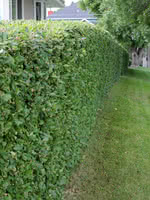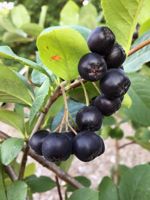Mon-Fri 9am - 5pm Mountain time
Peking Cotoneaster vs Aronia Berry
Cotoneaster acutifolia
Aronia melanocarpa
NOT AVAILABLE THIS SEASON - MIGHT RETURN
NOT AVAILABLE THIS SEASON - MIGHT RETURN
Peking Cotoneaster is a medium-sized shrub that is well adapted to colder climates. Best suited for use as a hedge, Peking Cotoneaster has dark green foliage that turns a stunning reddish orange in the fall.
Hardy fruit guru, Bernie Nikolai (DBG Fruit Growers), has started to recommend grafting hardy pear varieties to Peking Cotoneaster after his experiences were successful and produced fruit faster than other rootstocks. Remember to leave some nurse limbs if you try this.
Aronia Berry produces black fruit that is often considered too astringent. This is why they are also referred to as Black Chokeberry. It is native to Eastern Canada and the Eastern United States. White to pink flowers appear in the spring which provides a nice contrast to the dark green foliage. In fall the leaves turn a vibrant orange to red.
It has a fast growth rate, strong roots, and can tolerate growing in wet soils. This makes it well suited for various projects including forming hedges, bank stabilization, erosion control, and in wetter riparian areas. They are also well suited as an understory plant as it grows well under other trees.
Aronia berries have their own unique flavour. The polyphenols and anthocyanins are touted as healthy antioxidants and lots of research seems to be underway on the health benefits of this fruit.
Peking Cotoneaster Quick Facts
Aronia Berry Quick Facts
In row spacing: 0.3 m (1.0 ft)

